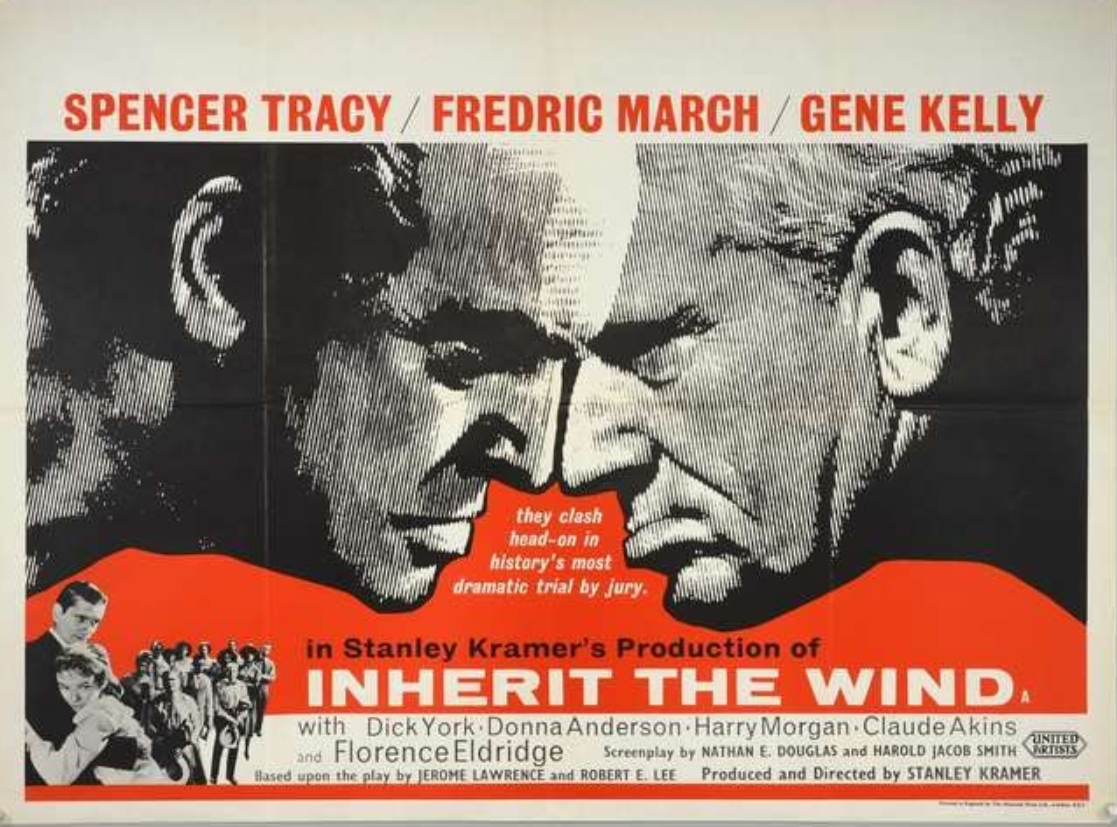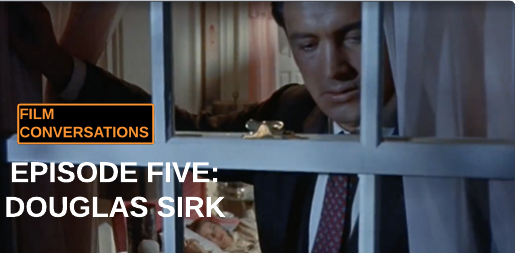
Inherit the Wind (1960)
In this conversation, Dennis Claxton, RC Roberts and yours truly discuss the 1960, American film, “Inherit the Wind”. The film, based on a play of the same name and inspired by the Scopes ‘Monkey’ Trial of 1925, is, among other things, an allegory for the McCarthy era House Un American Activities Committee Hearings and their impact. Wikipedia describes the film:
“Inherit the Wind is a 1960 American film based on the 1955 play of the same name written by Jerome Lawrence and Robert Edwin Lee. The film was directed by Stanley Kramer. It stars Spencer Tracy as lawyer Henry Drummond and Fredric March as his friend and rival Matthew Harrison Brady. It also features Gene Kelly, Dick York, Harry Morgan, Donna Anderson, Claude Akins, Noah Beery Jr., Florence Eldridge, and Jimmy Boyd.
Plot
In the small Southern town of Hillsboro, in the 1920s, a schoolteacher, Bertram Cates, is about to stand trial for teaching Darwinism, which is a violation of state law. Cates is denounced by town leaders including Reverend Jeremiah Brown.
The town is excited because Matthew Brady, a noted statesman and three-time presidential candidate, will be assisting in the prosecution of Cates. A staunch foe of evolution and a Biblical scholar, Brady will sit beside prosecuting attorney Tom Davenport, in the courtroom of Judge Coffey”
More at Wikipedia
This was an excellent and wide ranging discussion. RC Roberts is writing an essay on the film which will be posted here and at his Substack when ready so watch this space.
Some references from the conversation…
The Judge & the Historian: Marginal Notes on a Late-twentieth-century Miscarriage of Justice
VIDEO
AUDIO

EPISODE TWO: ATOMIC AGE CINEMA
In today’s episode, which is our second, my co-hosts and I - Dennis Claxton and RC Charles Roberts - talk about two films from what’s known as the atomic age genre of science fiction - Panic in Year Zero and The Incredible Shrinking Man.
Atomic age, in this context, refers to that period following the use of atomic weapons against the Japanese cities of Hiroshima and Nagasaki in 1945 by the US, when fear, hope and wonder about atomic energy and weapons were right on the surface of the culture, influencing film and the form of science fiction and disaster cinema movie goers saw from the 1950s through the 1960s.
Panic in the Year Zero, released in 1962 and starring Ray Milland, tells the story of a Los Angeles family who, while on a weekend camping trip, witness the destruction of their city by an atomic weapon and find themselves in a world that’s unraveling. The Incredible Shrinking Man, starring Grant Williams, and based on a book (The Shrinking Man by is a very different film; a man is exposed to a radioactive cloud while on a boating trip with his wife that causes him to begin shrinking, losing height and mass at the rate of about an inch a week. The film, in its way, explores themes of masculinity and even human existence.
This was a great conversation but you may at times notice a bit of coughing and sneezing on the audi track. Both Charles and Dennis were a bit under the weather when we recorded and I became so engaged in the flow of our chat I forgot at times to mute. Even so, I hope you enjoy listening to this as much as we enjoyed recording it.

EPISODE THREE: THE KILLING (1956)
In today’s episode, we speak with Dr. Robert Beshara Assistant Professor of Psychology and Humanities at Northern New Mexico College. He is also the founder of CriticalPsychology.org and a musician and composer. The music you hear in the background is istimtaa from Robert's excellent album, Horny Cricket (link in the show notes) For more information and Dr. Beshara's work, please visit www.robertbeshara.com
Today’s movie is The Killing, directed by Stanley Kubrick and released in 1956. I will read the Wikipedia synopsis for you now…
“The Killing is a 1956 American film noir directed by Stanley Kubrick and produced by James B. Harris. It was written by Kubrick and Jim Thompson and based on Lionel White's novel Clean Break. It stars Sterling Hayden, Coleen Gray, and Vince Edwards, and features Marie Windsor, Elisha Cook Jr., Jay C. Flippen and Timothy Carey.
Johnny Clay is a veteran criminal planning one last heist before settling down and marrying Fay. He plans to steal $2 million from the money-counting room of a racetrack during a featured race. Johnny assembles a team consisting of a corrupt cop, a betting window teller to gain access to the backroom, a sharpshooter to shoot the favorite horse during the race to distract the crowd and keep the winnings from being paid out, a wrestler to provide another distraction by provoking a fight at the track bar, and a track bartender.”
It’s a fantastic film and Robert is an insightful and fun person to talk to so I hope you enjoy.
Resources
Wiki entry: https://en.wikipedia.org/wiki/The_Killing_(film)
Robert Beshara’s album, ‘Horny Cricket’ (we’ll feature music from this album during the show): https://hornycricket.bandcamp.com/album/istimt
American Film Institute Entry: https://catalog.afi.com/Catalog/moviedetails/51890
Roger Ebert Review: https://www.rogerebert.com/reviews/great-movie-the-killing-1956
Original Trailer: https://youtu.be/m9wMEDJuGnE
Sterling Hayden Interview: http://www.geraldpeary.com/interviews/ghi/
Making ‘The Killing’: An Auteur and His Writer:
https://vaguevisages.com/2023/03/24/the-killing-essay-stanley-kubrick-movie-film/
In today’s episode we speak with Dr. Isabel Millar, Author of The Psychoanalysis of Artificial Intelligence (published in 2021 - which I highly recommend). Dr. Millar is Associate Researcher at Newcastle University Department of Philosophy and both Fellow and Faculty at the Global Centre for Advanced Studies, Institute of Psychoanalysis.
She is currently working on her next book Patipolitics for Bloomsbury Philosophy.
Today’s film is Ex Machina, written and directed by Alex Garland and released in 2014. The film is ably discussed in The Psychoanalysis of Artificial Intelligence from a Lacanian perspective, an appropriate toolkit.
I’ll use the synopsis Isabel provides in Chapter 5, titled What Can I Know? Artificial Enjoyment - from page 138 of her book:
"Ex Machina depicts the attempt of a young, male computer genius Caleb, to evaluate the potential “self-consciousness” of Ava, an embodied Artificial Intelligence, via the fabled Turing Test. Hidden away in a secret bunker in the woods, Caleb is watched over by tech Svengali Nathan, the creator of a series of female AIs who appear—physically at least—uncannily human. Over the course of several days, Caleb meets and talks with Ava and tries to discern what is really going on behind the perfectly beautiful silicone face. Very soon Caleb’s Turing Test turns into a love affair, as Ava implores him to help her escape captivity from her life of subservience at the whims of Nathan. By the end of the film Ava tricks Caleb into believing she wants him, kills Nathan and leaves Caleb for dead. She escapes the concrete bunker alone and, for the first time, steps outside into the lush green natural world."
We were very happy that Isabel granted us a bit of her time to discuss this film and the way it illustrates some of the themes of her book. Check out the show notes for links and references; we hope you enjoy.
Links
The book: https://link.springer.com/book/10.1007/978-3-030-67981-1
The film: https://en.wikipedia.org/wiki/Ex_Machina_(film)
Dr. MIllar’s homepage: https://www.isabelmillar.com
Dialogue between Dr. Millar and Mary Wild on Wild’s podcast (requires a patreon subscription): https://www.patreon.com/posts/56533141

In today's episode, my co-hosts and I will be talking about the work of Douglas Sirk, one of the great film directors of the 20th century. In the course of gathering notes for this episode and this introduction, I found an intriguing bio of Sirk, posted at the 'Senses of Cinema' website (link in show notes). I'll just read the first few paragraphs to set the stage.
"Douglas Sirk was one of the 20th century cinema’s great ironists. And perhaps the most distinctive characteristic of the films he made in Europe and America is the way they are able to create a gulf between how his characters see themselves and our view of them.
Sirk’s characters grapple with the same problems that have always afflicted men and women and parents and children, to do with love, death and social circumstance. In some cases, they do so in a world of melodrama – as in films as various as Schlussakkord (1936), La Habanera (1937), There’s Always Tomorrow (1955) and Imitation of Life (1958). In others, it’s a world of colour and music – as in the trio of comedy-musicals he made during the 1950s, Has Anybody Seen My Gal? (1951), Meet Me at the Fair (1952) and Take Me to Town (1952), part of a series he had planned about small town America. In others, it’s the excitement of mystery, romance or adventure – in films such as Lured (1946), Taza, Son of Cochise (1953, shot in 3-D) and Captain Lightfoot (1954).
But Sirk adds another layer to the shape of the films and to his characters’ struggles within them. All around, but beyond the reach of their vision, are forces which define the parameters of their lives. These are evident at the most basic level, in the way that the plots almost always hinge on problems for which the only solution becomes a convenient miracle, a deus ex machina."
We will talk about Sirk's work and life broadly and more specifically, we will use his 1956 melodrama masterpiece, 'Written on the Wind' as the focus of our discussion. I hope you enjoy it.
Links
Wikipedia: https://en.wikipedia.org/wiki/Douglas_Sirk
Interview with Sirk (1978)
https://www.filmcomment.com/article/sirkumstantial-evidence/
Sense of Cinema Bio: https://www.sensesofcinema.com/2004/great-directors/sirk/
Douglas Sirk Remembers (in German)
https://youtu.be/a0YfrQMoJIw
Slightly French (Douglas Sirk, 1949)
https://youtu.be/D6g9hY0q190
Hitler’s Madman (directed by Sirk)
https://en.m.wikipedia.org/wiki/Hitler%27s_Madman
Roger Kirby Criterion Commentary
https://youtu.be/hiK16IMRzbU
Interview with Sirk (1978)
https://www.filmcomment.com/article/sirkumstantial-evidence/
Douglas Sirk Remembers (in German)
https://youtu.be/a0YfrQMoJIw
Sleep My Love
https://youtu.be/vv-hsULb748

In today’s episode, we are very happy to welcome Mary Wild to the show to talk about Alfred Hitchcock’s 1958 masterpiece, Vertigo. On her Twitter page (I refuse to call that platform, X) Mary describes herself as a Freudian cinephile and feminine jouissance maximalist, which is both a marvelous phrase and fantastic declaration. Mary is the creator of the Projections lecture series at the Freud Museum, London, co-host of the Projections Podcast, contributor to Evolution pod and the host of her own podcast on Freud, film and related topics. I’m happy to say I was a guest on Mary’s podcast a few months ago to talk about how AI is treated as a topic in film.
A note about this episode… We originally recorded an episode with Mary on August 6. Unfortunately, there was a technical problem that caused the loss of the entire recording. Very kindly, Mary agreed to come on again to re-record. We’re very glad and grateful that she did not only because it gives us a chance to talk with Mary about Vertigo but also, because it gives us a chance to more fully explore her Freudian approach to the film.
There will be links to all the references in the show notes. This was a great conversation which we looked forward to for some time; Vertigo is a brilliant film that rewards rewatching and Mary is a brilliant person to walk us through it. I hope you enjoy.
Links
Mary Wild Podcast
https://www.patreon.com/marywild
Freud Museum London
Projection Series at the Freud Museum
https://www.freud.org.uk/tag/projections/
Projections Podcast
https://open.spotify.com/show/2O5n4yhnRGpreyTS7tDfLm
Evolution of Horror Podcast

In today´s episode, we speak with Amrita De, Postdoctoral fellow in the Center of Humanities and Information at Penn State University about All That Breathes, a 2022 documentary film directed by Shaunak Sen. Let me read a bit about Amrita from her page on the Penn State University website:
Amrita´s research focuses on global south masculinity studies and affect theory. Her works have been published in NORMA, Boyhood Studies, Global Humanities and are forthcoming in other edited collections. She is also working her way through her first novel centered around contemporary Indian Masculinities.
A link to Amrita´s work is in the show notes below.
Here is a synopsis of All That Breathes from the film´s Wikipedia page:
”All That Breathes is a 2022 documentary film directed by Shaunak Sen. It is produced by Shaunak Sen, Aman Mann and Teddy Leifer under the banner of Rise Films. The film follows siblings Mohammad Saud and Nadeem Shehzad, who rescue and treat injured birds in India.
The film had its world premiere at the 2022 Sundance Film Festival on January 22, 2022, where it won Grand Jury Prize in World Cinema Documentary Competition. It also had a screening at the Cannes Film Festival in the special screening section, where it won the Golden Eye. It was later nominated for the Academy Award for Best Documentary Feature Film.
Two brothers Saud and Nadeem were raised in New Delhi, looking at a sky speckled with black kites, watching as relatives tossed meat up to these birds of prey. Muslim belief held that feeding the kites would expel troubles. Now, birds are falling from the polluted, opaque skies of New Delhi and the two brothers have made it their life’s work to care for the injured black kites.”
[...]
This was an excellent conversation and we were very glad to have Amrita as a guest. I hope, you enjoy.
Show Note Links
All That Breathes - Wikipedia
https://en.wikipedia.org/wiki/All_That_Breathes
Amrita’s Homepage
Variety Interview with the film makers
https://www.youtube.com/watch?v=BbLoQ8GPxeA
ASAP Connect Interview with Mohammad Saud and Salik Rehman


